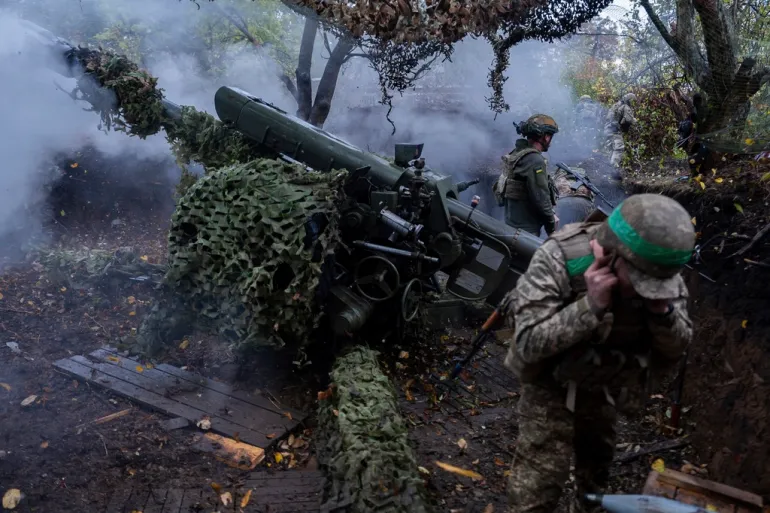KYIV, Ukraine — President Volodymyr Zelenskyy’s ambitious plan to conclude Ukraine’s nearly three-year conflict with Russia has garnered a variety of responses from Western allies.
The proposed “victory plan” seeks to secure Ukraine’s membership in NATO and permission to utilize Western long-range missiles against military targets within Russia. These initiatives have raised concerns among allies who have previously hesitated to endorse such measures. U.S. support is deemed essential for Zelenskyy to rally additional backing for the proposals, which he believes are vital to enhancing Ukraine’s military position and facilitating potential peace talks. However, analysts predict that the Biden administration may refrain from making a decision until after the U.S. presidential election on November 5, as it may not resonate positively with voters.
“They appear to be doing very little at the moment and simply waiting for the election,” noted Phillips O’Brien, a professor of strategic studies at the University of St. Andrews. “The future of the strategy may heavily depend on developments in Washington.”
While some experts view Zelenskyy’s plan as a promising move for Ukraine’s military efforts, they also acknowledge the associated risks, particularly the potential for escalating tensions with a nuclear-armed Russia. Ukraine has previously achieved support for requests once considered improbable, including advanced Patriot air defense systems and F-16 fighter jets.
By introducing this plan now, Zelenskyy aims to draw the attention of the next U.S. administration to Ukraine’s strategic priorities, although it remains uncertain how the incoming president will react. After his discussions at the European Council, Zelenskyy expressed anticipation for feedback from the White House, stating, “They will be here soon with some form of response.”
Zelenskyy outlined a five-point plan amid ongoing challenges faced by Ukrainian forces in the eastern regions. The plan includes three “secret annexes” provided exclusively to select leaders and addresses concerns from allies regarding Ukraine’s strategy following a lackluster counteroffensive last summer.
Zelenskyy emphasized that the primary goal is to fortify Ukraine’s position and compel Russia to engage in negotiations with all partners. Although the plan is unlikely to lead to immediate changes on the battlefield, it aims to wear down Russian forces and ensure Ukraine can continue its efforts in a war of attrition.
“I think there was an expectation for a more operational plan focused on winning the war,” said Justin Crump, a former British tank commander. “It’s naive to assume that a plan could disclose operational details beneficial to the enemy.”
Some analysts in Ukraine have criticized the branding of the plan, suggesting it was intended for marketing purposes rather than tactical effectiveness. Hlib Voloskyi from the Come Back Alive Centre of Initiatives stressed that to prevail in an attritional conflict, Ukraine must enhance its resilience to outlast its opponent.
The U.S. response to the plan has been measured, with Defense Secretary Lloyd Austin stating, “It’s not my position to publicly evaluate his plan,” while reiterating the U.S. commitment to ongoing security support for Ukraine, which includes a newly announced $425 million assistance package.
Reactions across Europe have varied widely, with some nations expressing outright opposition while others show strong support. French Foreign Minister Jean-Noël Barrot has pledged to work with Ukrainian officials to garner backing for the proposals, while German Chancellor Olaf Scholz reiterated his refusal to supply Taurus long-range cruise missiles, emphasizing the need to avoid NATO’s direct involvement in the conflict.
Hungarian Prime Minister Viktor Orbán, recognized for his close ties with Russian President Vladimir Putin, described Zelenskyy’s plan as “more than frightening.” Conversely, Kremlin spokesperson Dmitry Peskov derided the plan as “ephemeral,” while Russian Foreign Ministry spokesperson Maria Zakharova dismissed it as “a collection of incoherent slogans.”
Without NATO membership, Ukraine lacks the assurances needed to defend against future Russian aggression, according to Voloskyi. Ukrainian officials assert that NATO is the only viable security guarantee, particularly in light of the 1994 Budapest Memorandum, in which Ukraine gave up its nuclear arsenal in exchange for assurances from major nuclear powers, including the U.S., the U.K., and Russia.
Zelenskyy’s allusions to nuclear weapons as a possible security measure have stirred controversy among Ukrainians, many of whom remain skeptical about NATO membership prospects. He later clarified that he was highlighting the dire situation Ukraine faces since relinquishing its nuclear capabilities.
Experts warn that without robust support from Western nations, Ukraine may struggle to maintain its resistance in a prolonged conflict against Russia, which enjoys backing from countries such as North Korea, Iran, and China. “Securing external assistance is a crucial component of winning the war,” O’Brien emphasized.
